latest news
Grape intake reversed stress-related cognitive, behavioural and biochemical deficits, according to a University of Houston study
Results from a study recently published in the Journal of Nutrition Research have suggested that a grape-enriched diet may help over come the effect of stress.
In the study, researchers observed a protective role of grapes on stress-induced anxiety-like behaviours, and learning and memory deficits in an animal model of post traumatic stress, attributed to both gene activation and enhanced antioxidant activity resulting from grape intake.
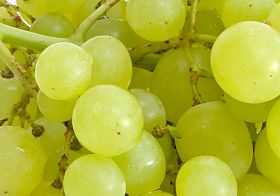
This study, conducted at the University of Houston in the US, investigated the protective role of grapes against stress, and the mechanisms by which grapes achieved this.
For the animals on grape-enriched diets, freeze-dried, whole grape powder was added to the drinking water for 3 weeks, followed by either the stress or control exposure, and then behaviour tests.
The results showed that feeding the animals a grape-enriched diet prior to stress exposure successfully countered the detrimental effects of that stress on brain function and behavior. Specifically, grape intake prevented the memory impairment and anxiety-like behaviors that were observed in the rats with stress but no grapes in their diet.
The researchers propose that the protective benefits of grape consumption start with enhanced antioxidant activity that reduces oxidative stress levels: systemic markers of oxidative stress were reduced in the grape consuming group. Once the oxidative stress is minimised, activation of key genes that help promote the survival of brain nerve cells is triggered.
“Grapes appear to influence several processes that support brain health,” said Samina Salim, the lead investigator. “The potential interplay between grapes’ antioxidant activity and their impact on cell communication is very intriguing to us and we intend to study it further.”
Cattle prices are coming under pressure from slow consumer demand and ample supply, Eblex has warned.
This combination, experienced by both domestic and imported beef, continues to drive some restraint among processors, the red meat levy board reported, resulting in “downward pressures” on the prime cattle market.
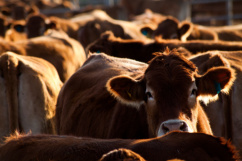
In the week ending 18 April prices for all classes of cattle fell – all prime deadweight cattle prices were 3p down on the previous week.
Similar pressures have been felt in the Scottish beef cattle trade, where animals have been kept on farms instead of being sent for slaughter. Eblex said this was giving rise to fears the beef market could return to the crisis point it found itself in last year when the beef price crashed.
However, Debbie Butcher, senior market analyst at Eblex, said this could change as the season moves into its “transitional period”.
“This development has been a feature of the market for a couple of months or so and reflects the continued imbalance in supply and demand. However, with the expectations that cattle supplies are set to tighten, (throughputs in March and April so far suggest this may have already started) the balance in the trade could move into a position that is less out of kilter, in particular as the season moves towards its transitional period between yarded and grass-fed supplies,” Butcher commented.
Eblex reported that lower cattle numbers in Ireland, resulting in fewer imports, could help support the market in the medium term.
“However, with the current fine weather unlikely to stimulate demand for roasting cuts, it is likely that caution among processors could persist in the short term, which, coupled with the euro exchange rate and its impact on the competitiveness of UK product on the continent, continues to offer some downside risk to the trade,” Butcher concluded.
Crawshaws Butchers saw sales rise 17% in the year ending 31 January 2015, helped by a new site opening.
The company’s year-end results to the end of January revealed that total group sales rose from £21 million (m) in 2014 to £24.6m, with profit before tax standing at £1.2m.

Average customer spend has continued to rise, according to Crawshaws, up 3.5% to £6.22 versus last year. The company explained that this was down to a focus on larger value packs and multi-buy offers. Customer numbers are 3.2% higher than last year “driven by our hot cooked products as we improve the range and consistency of our lunchtime and take-home offer”, the report added.
Chairman Richard Rose said: “I am pleased to say that, in November, we moved from three separate head office and factory locations into one newly refurbished facility in Rotherham. This single location can now support up to 60 shops and also contains a new factory shop, which is performing well above expectations.”
Crawshaws Butchers has 22 retail outlets, as well as a manufacturing and distribution centre, across Yorkshire, Humberside, Nottinghamshire and Lincolnshire.
The company said: “In line with our growth strategy, we have now successfully launched 10 new shops in Retford, Castleford, Chesterfield, Mansfield, Huddersfield, Doncaster, Bramley, Derby, Sheffield and, more recently, a factory shop at our head office site in Rotherham.”
Crawshaws has a plan to open 200 shops, and Rose added: “The post-year-end acquisition of Gabbotts Farm has provided 11 additional profitable shops and a distribution centre in the north west of England. We have also recently signed leases on new shops in Leeds and Bolton, which are currently being fitted out. In addition, there are a number of other locations in the process of being signed up.”
Berry breeders have pooled resources in new programme to trial strawberry and raspberry varieties in the Netherlands
Scottish soft-fruit firm Angus Soft Fruits has partnered with Dutch company Genson BV on a new strategic raspberry and strawberry-breeding programme.
The arrangement between the two companies will see new varieties from Angus Soft Fruit’s breeding programme trialled in the Netherlands.
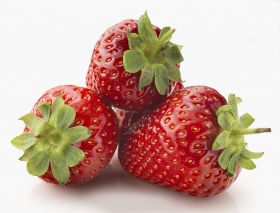
Selected varieties will then be used across all of northern and central Europe, excluding the UK.
Genson BV managing director Marc van Gennip said: “Access to a breeding programme that allows Genson BV to select new varieties to meet the specific requirements of their customer base both for fruit production and retail sales is an exciting new development for the future. Watch this space!”
“The Angus Soft Fruits model is very straight forward,” said Angus Soft Fruits’ R&D director, Dave Griffiths. “Our principal business is as producers of soft fruit. We are very clear that any changes or alterations to the varieties we propose from our breeding programme, offer a significant improvement over currently produced commercial varieties. We are delighted to be working with Genson BV and are excited by the new opportunities this offers everyone involved.”
Van Gennip added: “Over the past year or so, we have reviewed our activities in soft fruit and concluded that we would like to offer more to our customers both at the point of production and the sale of soft fruit.
“We looked at various models of innovation in the soft fruit industry and concluded that the Angus Soft Fruit model was most suited to our requirements. Angus Soft Fruits have, over the years really focused on the needs of their grower base and have demonstrated that an in house programme that has clear objectives can, over a short period of time, provide exciting options for those involved.”
Angus Soft Fruits has produced several successful commercial varieties in the past, including premium variety Ava, day-neutral variety Islay and long-season variety Avarosa.
The company also has several new June-bearer varieties in the final year of selection process for imminent release, as well as new raspberry varieties that show “great commercial potential”.
Sainsbury’s has launched a new range of salads which include edible blossoms and micro-herbs.
The retailer said the move responds to food trends it has identified among its customers.
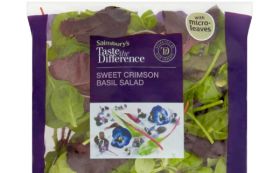
The range includes Taste the Difference (TTD) Sweet Crimson Basil Salad, including micro-leaf crimson basil, colourful baby leaves, and viola flowers; TTD Aromatic Oriental Salad, comprising coriander and purple shiso, with tender baby spinach, sweet red batavia lettuce and tatsoi; TTD Powerful and Punchy Salad, featuring wild rocket and tender baby watercress, with savoury baby red chard, spicy young nasturtium leaves, micro-leaf rocket and radish cress.
Georgina Lunn, Sainsbury’s product developer for fresh produce, said: “We’ve seen a trend for customers making everyday food more exciting, and this new range of salads helps them to create salads which are full of colour, texture and intriguing flavours using more exciting leaves, micro-herbs and even edible flowers.
“We’ve used viola flowers, which have a velvety texture, intense purple colour with a lettuce-like flavour – the perfect finishing touch to a summer salad.”
The new range of bagged salads launch in Sainsbury’s this week from 27 April 2015, and are widely available in store and online priced at £1.75.
Italian apple association Assomela and the French inter-professional organisation Interfel have been awarded more than €2.8m in funding by the European Commission to support a three-year campaign aimed at boosting consumption of apples in non-EU markets.
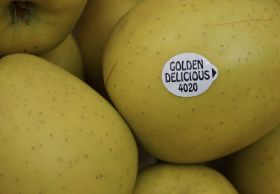
The campaign, which has a combined budget of €5.6m including funds provided by Assomela, Interfel and their own governments, will continue the work carried out by the two organisations as part of a three-year project called European Fresh Attitude, which focused on apples and kiwifruit in so-called third countries.
The results of that project have been described as “extremely positive” by representatives of Assomela, which counts major apple suppliers Vog, VI.P, Melinda and La Trentina among its members.
The aim of the new project is to raise awareness and encourage exports of Italian and French apples to markets in Africa, China, the Middle East, Norway, Russia, South-East Asia and South Korea.
As well as enabling the groups to promote the campaign at key trade events likes World Food Moscow and Asia Fruit Logistica in Hong Kong, the funds will also be used to pay for PR activities at point of sale and at major sporting events in Morocco, Israel and Norway.
Giulia Montanaro, head of international relations at Assomela, welcomed the EC’s decision to renew its financial support for the campaign.
“Consolidating and increasing exports of Italian apples outside the EU is fundamental at a time like this and the project that’s been approved can be a useful tool for our member producer organisations in reaching that objective,” she said.
Montanaro added that the new project’s approval had been made more likely thanks to the good collaboration between Italian and French counterparts over the past few years, a kind of cross-border teamwork that could make it easier to enter new markets in future.